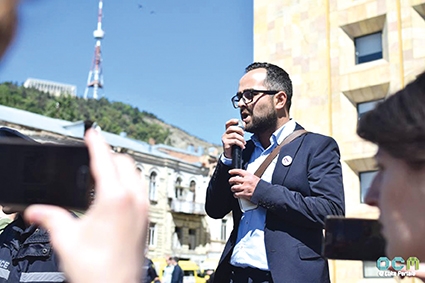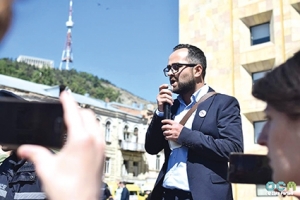Tbilisi Pride: “We’re Going to Stay Strong & United”
Exclusive Interview
The first ever pride will take place in Georgia this June. The multi-day event is an important step towards equality for the LGBTQI community in traditionally conservative Georgia. Social acceptance and support of minority groups are vital in a healthy democracy. Nonetheless, Tbilisi Pride is a politicized event that will face many challenges. Organized by a group of activists, Tbilisi Pride should promote change in Georgia. GEORGIA TODAY sat down with the event’s organizer, Giorgi Tabagari, to discuss his plans, hopes, and the challenges ahead for Tbilisi Pride.
Why did you decide to organize Pride this year?
Well there are a few reasons. First of all, we had experience organizing May 17 in previous years. The Church took away this date from us by organizing a family purity day. Every year, we had to fight for our space. It was a constant battle for who would stand in front of the parliament building. We wanted to move away from the vicious circle related to May 17 and do something new and bigger. The queer community has grown and become more empowered over the past six years. We believe that now is the time that we can come out from the underground and become more visible and vocal compared to what we’ve been doing in previous years. Pride will be bigger than May 17.
The event will run from June 18 - 23. What are you planning to do?
We plan a social theater with the participation of LGBTQI people of Kafka’s Metamorphosis. There will also be an international conference that will happen before Pride. Participants will stay for the March. We want to attract Eastern and Central European activists and people from Central Asia and neighboring countries. And then, there will be the March of Dignity that will conclude in Pride Park. We’ll have platforms to give speeches and perform music. It will be more of a celebratory moment.
What has the reaction been since you announced Tbilisi Pride?
The past three days were crazy with the media. It’s a major political event, in a way. It will occupy a lot of air time prior to June. Because of previous years, it’s a high profile event. We expected that to happen. We also expected threats from radical groups- that’s just the way they work. Pro-Russian groups generally work to spread aggression and hatred in society, dividing society over issues that are irrelevant and diverting attention from real social problems. Usually immigrants, women, LGBTQI groups and minority groups are the ones they target. We expected that to happen.
The Church is a vocal voice against the LGBTQI community in Georgia. Have they reacted yet?
They haven’t released a statement so far. 17 May 2013 was dominated by the Church. This time, we hope the Church will realize how it negatively affected them. Their ratings dropped and people saw that they were aggressive. This is not what Christian values are and we hope that they will realize this. We will try and talk to them.
In May 2013, a gay rights protest was met violently by anti-demonstrators. Do you expect more government and police support this time round?
May 2013 was the first experience of a major failure for the government. They failed to provide safety for participants. We hope it won’t happen again. They know how far it could go. We hope they draw some lessons from 2013 and will be more efficient this time. We don’t expect Pride to happen without a heavy police presence. We’re not living in Spain or the UK: we need police protection because this is happening in a hostile environment. But Pride can grow. This is how it works: you have police protection at the beginning and then it grows. Year after year, it gets better and fewer police are needed.
What challenges have you faced so far in organizing the event?
Pride is a challenging event in and of itself. It requires a lot of nerves and courage to organize. There are a lot of difficulties we will have to face along the way. Radical groups have already made it clear that it will not be easy for us. But I think we’re going to stay strong and united. We’re a big bunch of people and the group is really competent. Bravery is there. We hope that our motivation and determination will be enough to organize it peacefully and convey a message to people that living in a hateful and aggressive society is not beneficial to anyone. We want to use the next few months to hold media campaigns and explain to our citizens, government, and the international public that something needs to change. This is what pride is about. It’s not only about marching.
What do you hope to achieve by organizing Tbilisi Pride?
We want to change people’s minds and hearts. We want to speak about our problems in the first person. Coming out is still a problem in Georgia and not a lot of people are doing it. We want to tell society that we are everywhere. We are around you. We are your brothers and your sisters. We are everywhere. There is a gay person near you, it’s just that we’re living in this society so this person might not have stepped forward and told you.
We are facing a lot of issues and problems. The community is migrating because of aggression and hatred. This needs to stop. We need to build a society that is more inclusive and diverse and more accepting of differences. We will use the next few months to speak about these issues and talk to the public and government directly. After these four months, we want to successfully organize pride and have at least 5-10% of society who will be more understanding and empathetic towards the problems that other people are having.
It’s a sensitive issue for the public. We want to use this opportunity to pass the message to the right audience and say we need bigger support from the public and friends. Staying silent when someone is being killed because of their orientation or identity, or when somebody is pressured and oppressed is not ok. We need to talk about these issues. This how society grows. If we want Georgia to become a fully fledged democracy where human rights are respected, then we need to do something more.
By Amy Jones












